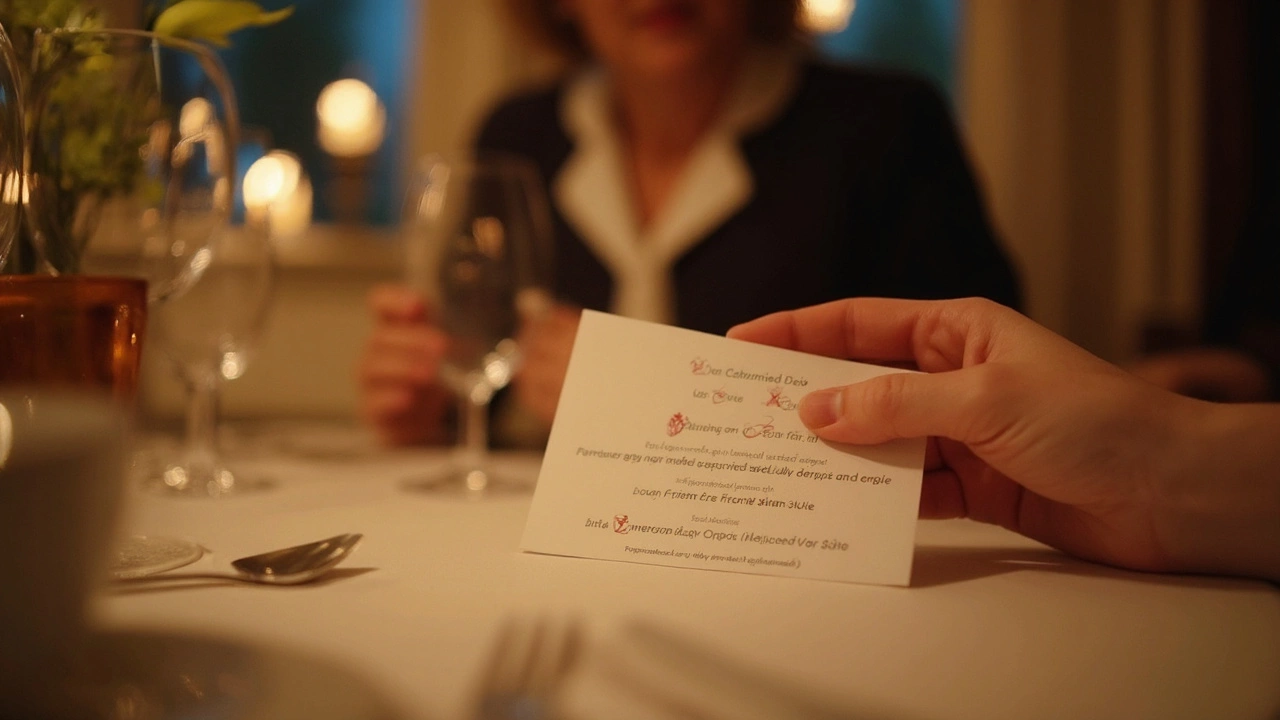Imagine this: You check into a gorgeous all-inclusive resort, ready to eat like royalty with zero worries about your bill. But then you sit down at dinner, and someone hands you a fancy menu with price tags. Wait, do you really pay for dinner at an all-inclusive?
Here’s the real deal—at most all-inclusive hotels, your main meals are covered, dinner included. You’re free to hit up the buffet, snack bars, or even order room service at some places, all without pulling out your wallet. But hold up—there are a few exceptions that can catch you off guard. Not every dinner option is 100% free at every resort.
If you’re a fan of specialty restaurants, think steakhouses, sushi bars, or restaurants with a famous chef’s name, there might be a cover charge or an extra fee for certain high-end dishes. Sometimes, the first visit to these places is free, but extras or return visits cost more. And drinks? Basic stuff is usually included, but that top-shelf tequila or fancy bottle of wine could land on your tab.
- What Does All-Inclusive Really Mean for Food?
- When You Might Have to Pay Extra
- Specialty Restaurants and Premium Add-Ons
- Tips for Getting the Most Value
- Allergies, Special Diets, and Fine Dining
What Does All-Inclusive Really Mean for Food?
The phrase "all-inclusive" sounds pretty dreamy, but let’s make sure you know exactly what you’re getting. Most resorts define all-inclusive as covering three main meals—breakfast, lunch, and dinner—plus snacks and standard drinks throughout the day. At a minimum, you’ll have all your basic meals taken care of, usually served buffet-style, with some resorts tossing in à la carte dining for added variety.
Let’s clear up what’s typically covered:
- Buffet restaurants (breakfast, lunch, and dinner)
- Snack bars and casual grills
- Standard non-alcoholic drinks (soft drinks, juice, coffee, tea)
- House alcoholic drinks (beer, basic cocktails, local spirits)
Here’s a quick look at what most all-inclusive hotels tend to include on the food front:
| Meal/Service | Included? |
|---|---|
| Buffet Meals | Yes |
| Casual Restaurants | Yes |
| Room Service | Depends on hotel |
| Specialty Restaurants | Sometimes, may require reservation or fee |
| Snacks by Pool/Bar | Yes |
| Premium Drinks | No (usually extra) |
Resorts in Mexico and the Caribbean—two hot spots for all-inclusives—almost always have at least one buffet restaurant plus a couple of sit-down places. Adult-only properties might offer more upscale options, while family resorts will go heavy on familiar, kid-friendly food.
Some places still have limits, though. For example, you might only get access to à la carte restaurants a few times per week, or there could be times when food outlets are closed between meals. Always check your hotel’s fine print so you won’t get hangry surprises.
When You Might Have to Pay Extra
All-inclusive doesn't always mean every single thing is free, especially if you get a little fancy or adventurous with your choices. Here are the main times you could see charges on your bill even at the most all-inclusive of all-inclusive hotels:
- Specialty Restaurants: Many resorts offer at least one or two upscale restaurants, but these often aren't included in the basic package. Expect to pay a cover charge or an upgrade fee, especially for things like steak, lobster, or anything labeled "gourmet." Sometimes you get one free reservation, but extra visits cost extra.
- Top-Shelf Drinks: Your standard drinks—like beer, house wine, and regular cocktails—are usually included. But top-shelf liquor, certain cocktails, or bottles of premium wine usually come with a cost.
- Room Service Fees: Not every all-inclusive covers room service. Some places charge a flat delivery fee, others add a tip automatically, and some offer limited free room service hours only.
- Private Dinners: Think beachside setups, candlelight, or special celebrations. These dinners are rarely included. They can add up fast, with prices ranging from $50 to over $200 per person.
- Special Events & Upcharges: Events like wine tastings, chef’s tables, or theme nights sometimes cost extra. If there's a sushi-making class or a special barbecue night, check whether it’s part of your package.
The table below shows the average extra charges you might see in 2025 at popular resorts:
| Extra | Average Fee (USD) |
|---|---|
| Specialty Restaurant | $30–$80 per person |
| Premium Wine/Bottle Service | $40–$250 per bottle |
| Room Service (outside standard hours) | $5–$12 per order |
| Private/Candlelight Dinner | $60–$250 per person |
It’s smart to read the fine print or ask before booking. Each hotel sets their own rules, so those hidden extras can sometimes pop up in surprising places—like at the coffee bar or ice cream shop.

Specialty Restaurants and Premium Add-Ons
This is where most folks get tripped up at all-inclusive hotels. Sure, your main buffet and a few grill spots might be fully covered, but what if you want something fancier or more unique? That’s where specialty restaurants come in—places like upscale steakhouses, sushi bars, or spots featuring celebrity chefs. At a lot of resorts, these aren’t always included.
Some all-inclusives let you snag a reservation at one or two specialty restaurants for free during your stay, but others tack on a cover charge—this can range from $15 to $60 USD per person, depending on the resort and type of meal. Want lobster or wagyu beef? Those premium dishes almost always cost extra, even at top-tier properties.
Drinks are another thing people wonder about. While standard beer, wine, and basic cocktails are included under your all-inclusive hotels package, anything top-shelf (think premium whiskey or imported champagne) can rack up charges fast. Buying a bottle of wine in a specialty restaurant, for example, is rarely covered, and can easily jump over $80 per bottle.
If you like numbers, check out common extras you might spot:
| Extra | Typical Cost (USD) |
|---|---|
| Steak or lobster upgrade | $20 - $50 |
| Premium wine bottle | $40 - $120 |
| Sushi at specialty bar | $15 - $40 |
| Romantic beach dinner | $90 - $250 |
Want to avoid bill shock? Always ask for a list of restaurants and what's included when you check in. Most resorts give you a map or a dining schedule showing what’s covered and what’s not. Sometimes, there are resort credits or dining coupons to use toward extras. Don’t be shy—ask if you get any throw-ins, like a free lobster night or a discount for longer stays.
Tips for Getting the Most Value
Want to truly relax at your all-inclusive hotel and snag the most bang for your buck? There are plenty of tricks you can use so you’re not missing out—or accidentally paying for stuff you thought was free.
- Scope out what's actually covered: Before you eat, check the hotel’s dining info right on your phone or on the room TV. Many resorts have an app or a printed guide with full lists of included and paid extras. Don’t be shy about asking staff to clear things up.
- Book restaurants early: If your resort offers sit-down restaurants, book your favorites as soon as you arrive—or even before, online. The best spots fill up fast and last-minute tables are rare, especially for dinner.
- Buffets for flexibility: Buffets usually include everything, so they’re perfect if you want to try it all with no surprise charges. They’re also a lifesaver for picky eaters or families with kids.
- Double-check drink menus: The fine print matters. Standard cocktails and house wine are covered, but some imported brands or wines cost extra. If a bottle seems special or fancy, ask if it’s included.
- Room service often isn’t free: Lots of places charge a fee or add a tip automatically for room service, even if it’s just snacks. Check before you order if you’re watching your wallet.
- Spot special nights: Look for theme nights, like lobster feasts or BBQ parties, often included at no extra charge. But be careful—sometimes lobster or premium steaks sneak onto the menu for a fee.
Here’s a quick look at some common inclusions versus extras, based on typical 2024 resort policies:
| Included | Often Costs Extra |
|---|---|
| Buffet meals, basic sit-down restaurants, standard drinks (beer/wine/basic cocktails) | Specialty restaurants, premium drinks, bottles of wine or champagne, lobster or steak, room service, private dinners |
A recent survey from a major travel platform found that almost 65% of guests accidentally paid for at least one dinner upgrade or special drink, thinking it was included. So, take a second to check before ordering, and you’ll walk away feeling like a dinner pro—no surprise bills attached.

Allergies, Special Diets, and Fine Dining
If you travel with food allergies, need gluten-free, vegan, or just love posh meals, all-inclusive hotels handle these pretty well—but not all are on the same level. A lot of well-known hotel brands, like Club Med, Hyatt Ziva, and Sandals Resorts, now cater to all sorts of special cravings and health needs. Still, it pays to be a little nosy about how they do it, so you don’t end up stuck with only salad for dinner.
Most resorts ask about allergies and special diets when you book or check in. Some give you color-coded wristbands to alert staff. Others ask you to talk to the chef or kitchen manager at each meal. Don’t be shy—ask for ingredient lists or allergy menus. If you’re going for all-inclusive hotels, this is one area where being fussy pays off.
If you have serious allergies (like nuts, shellfish, or celiac disease), make sure the resort doesn’t just promise “we’ll do our best.” Ask them to show you written protocols or allergy menus before you book. Some resorts are also great with special requests like halal or kosher food, but you’ll need to give them a head’s up way before you arrive—sometimes weeks in advance.
For the fancier restaurants or chef’s tasting menus on site, you usually have to book ahead, and sometimes you’ll pay an extra fee—even at an all-inclusive. These places can usually handle special diets, but again, the more notice, the better your experience.
Here’s a quick look at what some major hotel brands offer for allergies and special diets:
| Hotel Brand | Allergy Support | Special Diet Options |
|---|---|---|
| Sandals Resorts | Allergy protocols, allergy menus | Vegan, gluten-free, kosher/halal by request |
| Club Med | Chef consultation, ingredient info | Vegetarian, gluten-free, vegan |
| Hyatt Ziva | Custom meals on request | Vegan, gluten-free, diabetic-friendly |
Bottom line: whether you avoid certain foods for health, religion, or lifestyle, all-inclusive hotels are getting better every year at making sure you eat safely without missing out. Just be proactive. The earlier you ask, the more options you’ll have on your plate—literally.
